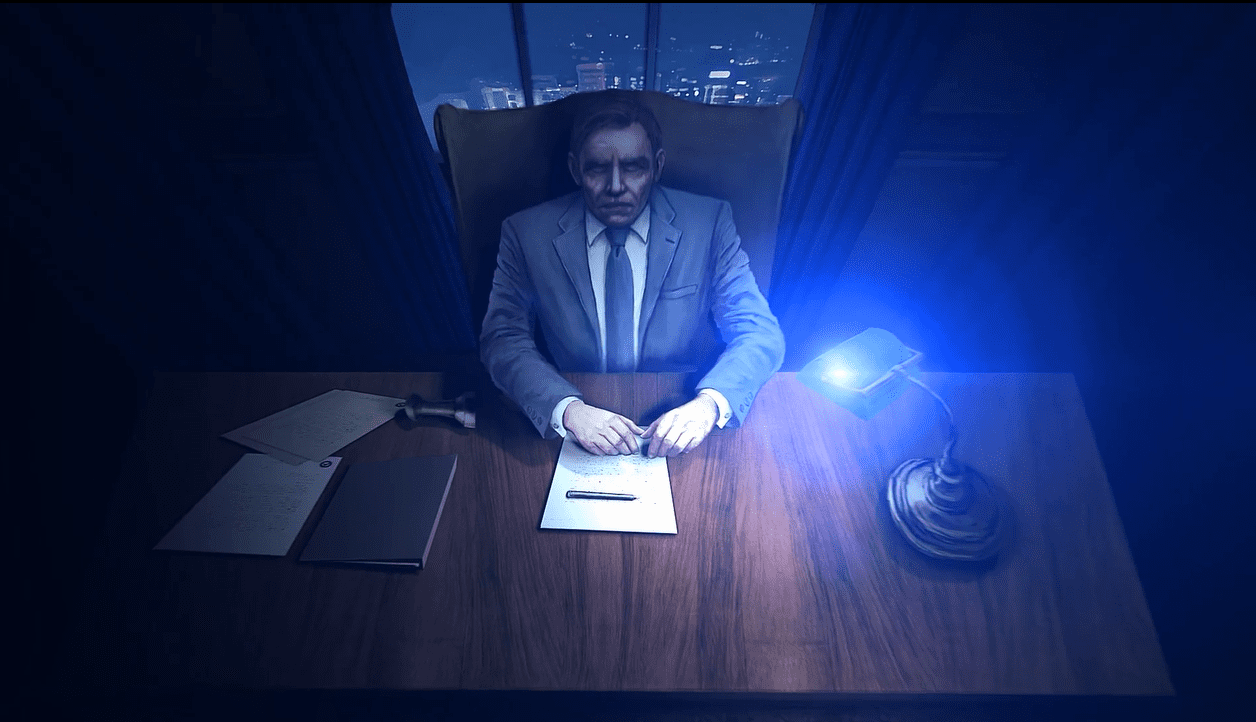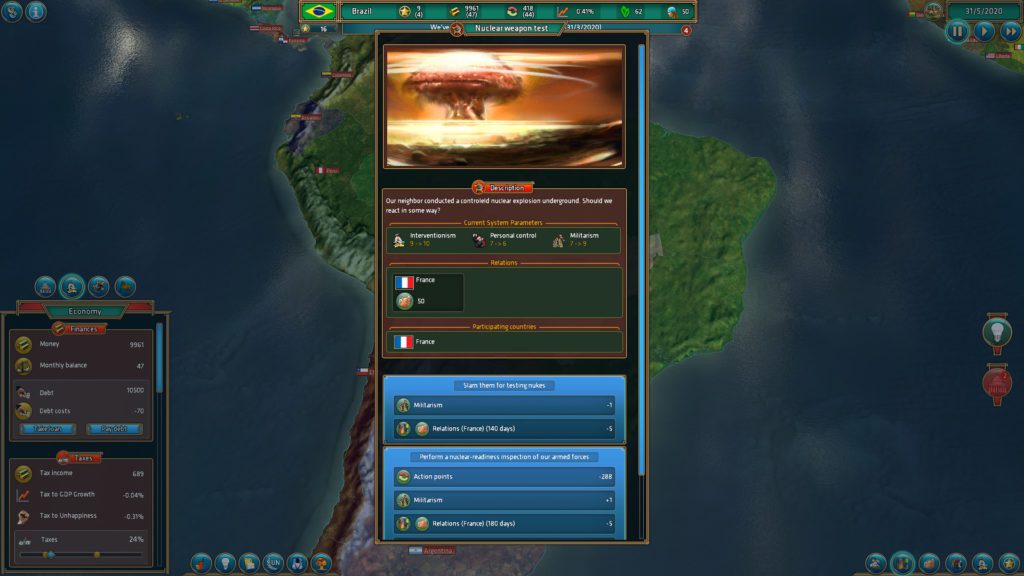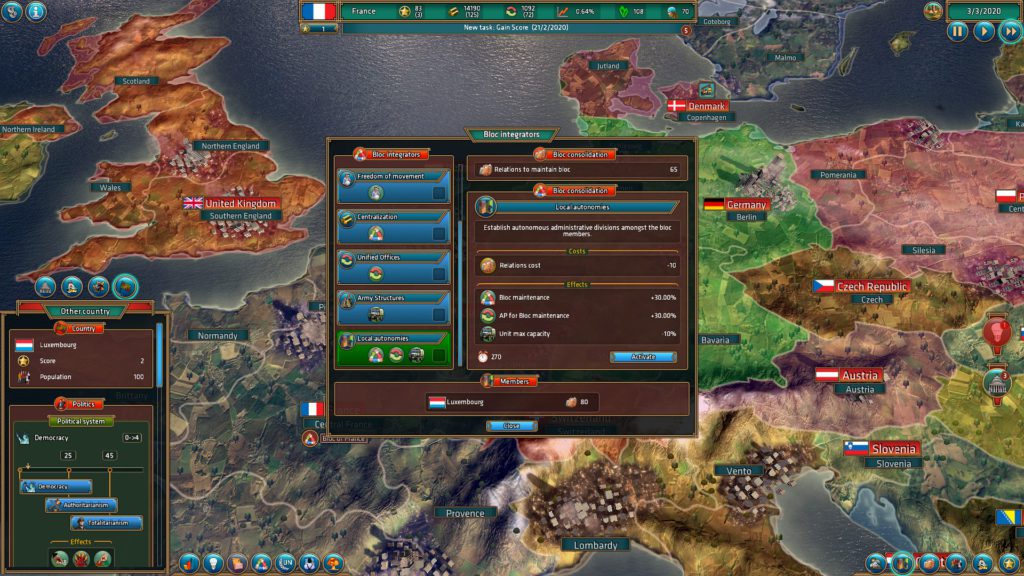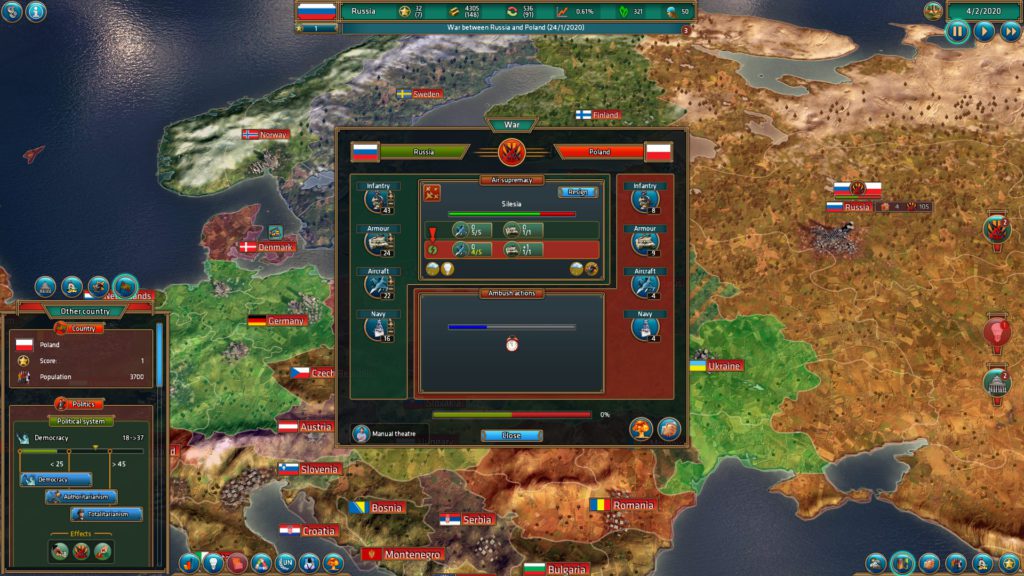The world stands on a knife edge. If there ever was a time for strategy games about contemporary politics being poignant, it is now. In Realpolitik you take over one of the worlds countries a few years from now, and guide it for as long as you can.
Like most games in the ‘grand strategy’ genre, your goals are entirely your own. Want to rule the world? Become the largest economy? Create a Communist utopia? It’s up to you what your objectives are, and that is one of the reasons why I love this genre so much. It is more freeform than the real or turn based strategies supplied by the likes of Civilisation VI, yet in many ways it also more restrictive. These are games about macro management, you won’t be able to influence individual cities, but you can control regions and laws, taxes and other such things.
Realpolitiks then stands against the other heavyweight of the Grand Strategy industry – Paradox. Paradox does not have a game set in the modern age, it’s closest being Hearts of Iron 4 which takes place in World War 2, yet features much of the same options and premise. In fact, the build up to World War 2 at the start of said game is almost a dead ringer for where we are now in the world, with far-right governments and movements slowly building power and influence across the world, and countries turning to isolationism and protectionist policies as the world seems to draw breath.
Compared directly against a game like Hearts of Iron 4 – Realpolitiks does not prevail. HOI4 is a £40 game made by an increasingly large and experienced studio, whilst Realpolitiks is made by a small developer ‘Jujubee S.A’ whom has only two other games on steam, both with middling to negative reviews, and published through 1C Company, that whilst does have a large inventory of games, most of them are quite niche.
I am pleased to say though, that Realpolitiks will not be a middling or negative review. In fact, it will be quite a good one. The developer was very wise in how he crafted this game, the scope is slightly smaller than its contemporaries and the gameplay is more streamlined and simpler, which let him make each of the areas of the title work great.
After selecting your country, you are presented with various scenarios. You can start the game just a few years from now, in 2020, mostly mirroring the modern world. Or you can go for fictional scenarios in the future, on in which the world has been mostly wrecked by wars, and the other in which the world has split up into many smaller countries based on their traditional counterparts, England being Albion and France being Gaul for example. There is also a tutorial, which whilst text heavy, is quite handy for a beginner.
After this, your route is your own. Your country has six main identifiers that either track progress or act as a resource. The first is score, which simply tracks where you are in the world based on a number of different trackers. The second is money – purely how much you have in cash reserves which you can spend on what you like. Most countries start with a lot of debt, so it is worth spending the first few years trying to pay this off, so that later in the game you do not have to deal with the inflation. The third is ‘Action Points’ which control everything from what research you can do, to the diplomatic options you have. This can be increased through a number of ways, such as researching certain technologies and building certain improvements to your regions. Next is GDP – a simple percentage which is influenced from everything else on this list. Then you have Natural Resources, this is used for importing and exporting and also building. Finally you have ‘HDI’, which tracks how intelligent your citizens are and what research you can do.
So whilst this all seems quite simple, it is nice that they all plug into each other some how, and are not simply used for linear reasons, meaning that it’s important to try and have some sort of balance. You are able to use a combination of action points and money to exert diplomatic influence on countries, either raising your relationship with them or inviting them to form a ‘bloc’ in which you can have shared currencies and other extra-national agreements. Research is very important and quite daunting at first as there is a large amount of different technologies to research, each increasing in a linear fashion towards the best tech. However the game is very clear on what each of the techs do, and it is never left ambiguous.
When playing these games, I tend to stick to politics and diplomacy. I like getting smaller countries in my grip, and then using their support to increase my GDP and worldwide influence. This can reveal itself in several ways in Realpolitik, there is a UN screen in which you can propose and vote on several proposals – having friends is helpful when you want to push a proposal that places sanctions on government types that are unfriendly to you. The various types of governments in the game range from Democratic to Authoritarian, and are influenced by how you play – if you start researching and taking undemocratic actions then you will slide to one side. This is the same for ‘Warmonger’, if you start attempting to sabotage another country or start declaring wars you will quickly become an international pariah.
War is currently the one weak point of the game. It’s quite clever in how it decides how many units you can maintain, based on a combination of your diplomatic prowess, technology level and population. Yet actual wars are quite confusing. They are taken through several screens in which you can select an action and your enemy can – and it seems somewhat random to who wins. This is compounded by the fact that you don’t actually control any individual units, meaning that deciding what to do in any given battle scenario is a bit of a dice roll. It’s a shame that war is handled poorly, because it means the game does not reach the dizzying heights it might have otherwise. As the rest of the game is currently working well, I would advise the developer to look at this area for a future update – an overhaul of the war mechanic would go a long way to making this a really great game.
Still, despite the shortcomings this is still a very fun, polished, easy to use grand strategy game that will suck up your time and you won’t regret any of it. I highly recommend picking this one up if you are into the genre, and the price is right.
You can purchase Realpolitiks on Steam here.








